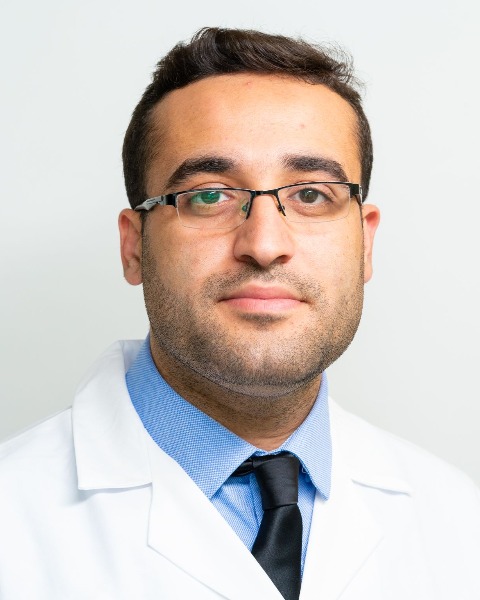Back
Poster Session A - Sunday Afternoon
A0716 - Gastrocolic Fistula After Roux-en-Y Gastric Bypass: A Case Report
Sunday, October 23, 2022
5:00 PM – 7:00 PM ET
Location: Crown Ballroom

Rami Musallam, MD
St. Vincent Charity Medical Center
Cleveland, OH
Presenting Author(s)
Introduction: Gastric Fistula is a well-recognized complication after Roux-en-Y gastric bypass (RYGB). We present a rare case of gastro-colic fistula that occurred many years following a RYGB.
Case Description/Methods: Our patient is a 68-year-old female nursing home resident with a past medical history of hypertension, diabetes, stroke, chronic ventilator-dependent respiratory failure and retrocolic RYGB surgery in 2001 who presented with dark maroon stool. The patient’s vitals were stable, abdominal exam was benign, and she had a gastrostomy tube in place (remnant stomach). Laboratory workup showed a Hgb of 6.4 mg /dl. Upper endoscopy showed ulceration and stenosis of gastro-jeujenostomy and gastro colic fistula. The fistula was intubated and showed feculent material from the transverse colon(Figure 1 A,B). The biopsies of the ulcers revealed chronic inflammation. Computed tomography (CT) imaging with oral and IV contrast showed contrast filling in transverse colon and changes consistent with gastro colic fistula(Figure 1 C,D). General surgery and bariatric surgery were consulted. However, she was not a candidate for surgical intervention due to her overall condition. She was discharged to a nursing home after management with a proton pump inhibitor (PPI) along with a blood transfusion.
Discussion: Fistulous complications occur in up to 1- 6% of patients who undergo RYGB surgeries. This is historically related to incomplete division of gastric tissue upon creation of gastric pouch. However, with new stapler technology, the staple line is completely divided and the chances of fitulous complications are signficantly decreased. Gastro-jeujenal anastomosis ulcer, leaks, and chronic infection might be contributing to contemporary fistulas. Like ulcers, most gastro gastric fistulas present with epigastric abdominal pain, oral intolerance, failure to thrive and/or bleeding. The patient was not a candidate for surgery due to her overall medical condition. Had the patient been a surgical candidate, exploratory laparoscopy with en-bloc resection of the fistula and reconstruction would have been the definitive surgical treatment for her gastro colic fistula. It is strongly recommended that clinicians take a multi-disciplinary approach to this rare, but critical complication of bariatric surgery to ensure overall patient health optimization.
Case Description/Methods: Our patient is a 68-year-old female nursing home resident with a past medical history of hypertension, diabetes, stroke, chronic ventilator-dependent respiratory failure and retrocolic RYGB surgery in 2001 who presented with dark maroon stool. The patient’s vitals were stable, abdominal exam was benign, and she had a gastrostomy tube in place (remnant stomach). Laboratory workup showed a Hgb of 6.4 mg /dl. Upper endoscopy showed ulceration and stenosis of gastro-jeujenostomy and gastro colic fistula. The fistula was intubated and showed feculent material from the transverse colon(Figure 1 A,B). The biopsies of the ulcers revealed chronic inflammation. Computed tomography (CT) imaging with oral and IV contrast showed contrast filling in transverse colon and changes consistent with gastro colic fistula(Figure 1 C,D). General surgery and bariatric surgery were consulted. However, she was not a candidate for surgical intervention due to her overall condition. She was discharged to a nursing home after management with a proton pump inhibitor (PPI) along with a blood transfusion.
Discussion: Fistulous complications occur in up to 1- 6% of patients who undergo RYGB surgeries. This is historically related to incomplete division of gastric tissue upon creation of gastric pouch. However, with new stapler technology, the staple line is completely divided and the chances of fitulous complications are signficantly decreased. Gastro-jeujenal anastomosis ulcer, leaks, and chronic infection might be contributing to contemporary fistulas. Like ulcers, most gastro gastric fistulas present with epigastric abdominal pain, oral intolerance, failure to thrive and/or bleeding. The patient was not a candidate for surgery due to her overall medical condition. Had the patient been a surgical candidate, exploratory laparoscopy with en-bloc resection of the fistula and reconstruction would have been the definitive surgical treatment for her gastro colic fistula. It is strongly recommended that clinicians take a multi-disciplinary approach to this rare, but critical complication of bariatric surgery to ensure overall patient health optimization.
